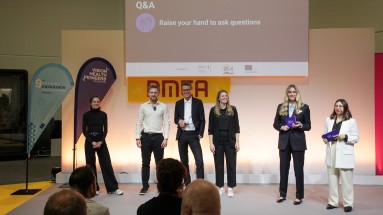Page content
Where medicine has blind spots

For example, the dentist who goes to the village with his practice. The AI agent that supports cancer patients. The telemedicine portal for the remote treatment of gynecological infections. Or the tool that makes structured data processing easy.
femote: Gynecological treatment with AI help
The start-up femote wants to enable women to access medical care more easily and independently – with the help of telemedicine and AI. The initial application is for gynecological infections, as these are often a source of shame, as co-founder Jil Berning explains at DMEA. femote offers a platform for remote consultations. Patients can determine the cause of the infection at home using simple rapid tests. Further data from period or other health trackers can be fed into the AI system, providing doctors with more information for diagnosis and prescriptions. The aim is to reduce trial-and-error treatments and provide patients with rapid medical assistance.
32bit: dental care where it is needed
In rural areas, dental practices are closing, and in nursing homes, half of the residents have no access to regular dental care. The start-up 32bit wants to bring the dentist to the patient, as CEO and co-founder Tobias Lippek says. A small van not only houses a small dental practice, but also the equipment for telemedicine, so that a general practitioner, for example, can be consulted directly. In the future, it is conceivable that several units can be connected to form pop-up clinics in a matter of seconds.
Ruby Care: the AI agent at the side of cancer patients
About 80 percent of cancer patients suffer from significant side effects from their oncology treatment, says Lukasz Siemaszko. His start-up Ruby Care has developed an AI assistant for those affected that analyzes symptoms and designs a personalized treatment plan. The services range from nutritional counseling to physiotherapy and psychological support. Patients can use a dashboard to enter their current mental and physical state or therapy milestones. The service is free of charge for those affected.
Chunkify: preparing data for AI
“Healthcare involves the collection of huge amounts of data, but it's usually in an unstructured format that AI tools can't process. chunkify converts documents like PDFs into structured data sources. Founder Dr. Jennifer Gaubatz explains that this is a process that is prone to error. This is because the content of the document is effectively broken down into bits of information – and related information is separated in the process, which distorts the data. “chunkify” ensures that the content is properly prepared, adding context where necessary and presenting the results in a clear and easy-to-understand way.
The four start-ups are supported by the Vision Health Pioneers Incubator.


